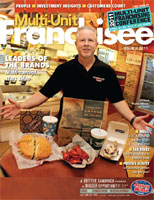Checking Your References: How to get Useful Responses From Former Employers
In the course of my speaking and consulting engagements, I've found that many franchisees have given up even trying to get meaningful references on promising job applicants. From the frustrating experiences recounted to me by others and my own company's policy, I know that most employers will report only dates of employment and the starting and ending wage or salary figures.
The information clampdown is the understandable, but misguided, response to the number of lawsuits filed--and won--by former employees who went to court to dispute what they believed were unfair, unfavorable references.
To complicate matters, the turbulent economy has made it possible for dishonest people to list defunct companies as former employers, as well as to create a job title and range of responsibilities that lead you to believe you've found just the person you've been looking for.
A pre-employment screening company in Colorado reports that one in 10 job applicants they screened had a criminal record. The fact that this company ran approximately 800,000 background checks last year makes that number even scarier. They also found one in three applicants misrepresented themselves on an employment application, and one in four provided false educational or credential records.
If you're not getting references, those numbers give you an idea of the kind of risk you're taking. When you rely only on information provided by the applicant, you're at risk for everything from hiring a dishonest person to a costly negligent hiring lawsuit. The only good news here is that if you at least try to get references and someone withholds unfavorable information, it will probably reduce your liability should anything untoward happen. (Just be certain to document your conversations and keep these records.) While this is a good defensive strategy, it's better yet to get the information you need to make a sound hiring decision. And it can be done.
Steps you can take
First, if it's not already a part of your employment application form, get written authorization from all applicants to check their references and run a background check (whether you actually do so or not). This release helps hold you and everyone who provides information harmless and free of any liability that could result from the process. (For a sample form, register at www.kleimanhr.com and visit the "Members" page.)
Then, when you conduct the interview, position the applicant to tell you the truth. Job seekers are inclined to put things in their very best light on their resumes, on your application form, and in person. However, there is a specific positioning technique that gets people to tell you what you need to know. It was discovered during the early use of lie detector technology for pre-employment testing when administrators found they would get more admissions pre-polygraph when they carefully positioned people to tell them the truth by saying, "We expect you to be honest. If you aren't completely honest and it shows up on the lie detector exam you'll be taking later, we cannot hire you."
Because people have a propensity to meet our expectations, we can use this technique to our advantage when conducting interviews--without hooking anyone up to a lie detector.
Job applicants show up for interviews well prepared to tell you exactly what they think you want to hear. However, if you tell them at the beginning of the interview that you expect the truth, you change their mindset.
Position applicants to tell you the truth by saying something like: "I'm going to be very open and honest with you about the job and our company, and I hope you're going to be open and honest with me about yourself. It doesn't matter if you've ever resigned, been fired, or had difficulty with a former employer. As long as you tell me about it, we can take it under consideration. But if you don't tell me, and we find out about it when we do your background check and look into your history, I can't hire you. Do you understand what it is I want?"
Then wait for the applicant to say something like, "Of course, you want the truth." Once you get this acknowledgement, you'll find applicants much more forthcoming. Approximately 90 percent will be more honest than they planned to be. Ten percent may still omit information or lie, but this approach gets most applicants to tell you what they really weren't planning to: the unvarnished truth.
There's also a simple tool you can add to your hiring process that will get you the references you need, as well as help managers to do a better job of interviewing. A reference verification form includes the release from liability discussed earlier and requests basic information about each relevant former job and employer. A separate form is completed for each of the applicant's last three jobs or the last five years of work. For each job, applicants are asked to rate themselves as they think their previous supervisors would on job performance measures such as initiative, dependability, productivity, effort, cooperation, and overall performance. (A copy of this form can also be found on the Members page at www.kleimanhr.com.)
When you're ready to do the reference check, you simply fax or email the completed form to the reference with a notation that you'll be calling to discuss the information. When the reference sees you have provided the applicant's release in writing, as well how the applicant's self-rating, you'll find you get a great deal more cooperation.
Experience shows that employers get useful responses and reliable answers more than 90 percent of the time when they use this tool. The technique is effective because you're asking references only to confirm the applicant's self-ratings--not to divulge information.
Additional strategies
If you still meet with resistance when using the form to check references, try these strategies:
- Have the applicant do the legwork. Ask the applicant to call and tell the reference you'll be calling, and that they'd appreciate it if the reference would cooperate. The applicant's follow-through (or lack of it) will tell you a lot about their viability as an employee.
- Try, try again. If you call the applicant's former department and are referred to human resources, try the department again later. You may get more information if a different person answers the phone.
- Have someone else try. Sometimes it's difficult to establish rapport with a reference. Someone else may be able to get more information.
- Speak with a former co-worker. You may get a more willing response from the applicant's previous co-workers than from their former supervisor. (It's also possible you may obtain valuable leads on other potential job candidates. After all, if the applicant you're checking on was unhappy enough to leave, chances are someone else may be too.)
- Appeal to the person; don't think of them as just a "reference." If you have established a good rapport with the person on the phone, but they will not give you any information, you could try this approach: "I understand you may not want to discuss this, but if you could, what would you tell me?" It may sound too simple, but it does work occasionally.
Whatever you do, don't give up or pass on getting reference information. If you don't get any cooperation and then hire the person, document your inability to get meaningful references and keep the records in the employee's file.
Also, take a moment to consider your own policy on references. As employers, we owe it to our employees and the publics we serve to hire decent, ethical, safety-conscious employees. One of the only ways to do this is by sharing information with one another about former employees.
When you hire new people, ask them to sign a release that, should they leave, allows you to give references when asked. If every employer would adopt this procedure, negligent hiring lawsuits would soon be only a footnote in law school texts.
Mel Kleiman is a consultant, author, and Certified Speaking Professional on strategies for hiring and retaining the best employees. He is president of Humetrics, a developer of systems, training processes, and tools for recruiting, selecting, and retaining the best. You can reach him at 713-771-4401 or [email protected].
Share this Feature
Recommended Reading:
FRANCHISE TOPICS
- Multi-Unit Franchising
- Get Started in Franchising
- Franchise Growth
- Franchise Operations
- Open New Units
- Franchise Leadership
- Franchise Marketing
- Technology
- Franchise Law
- Franchise Awards
- Franchise Rankings
- Franchise Trends
- Franchise Development
- Featured Franchise Stories
FEATURED IN

Multi-Unit Franchisee Magazine: Issue 2, 2011

$150,000
$250,000





 The multi-unit franchise opportunities listed above are not related to or endorsed by Multi-Unit Franchisee or Franchise Update Media Group. We are not engaged in, supporting, or endorsing any specific franchise, business opportunity, company or individual. No statement in this site is to be construed as a recommendation. We encourage prospective franchise buyers to perform extensive due diligence when considering a franchise opportunity.
The multi-unit franchise opportunities listed above are not related to or endorsed by Multi-Unit Franchisee or Franchise Update Media Group. We are not engaged in, supporting, or endorsing any specific franchise, business opportunity, company or individual. No statement in this site is to be construed as a recommendation. We encourage prospective franchise buyers to perform extensive due diligence when considering a franchise opportunity.